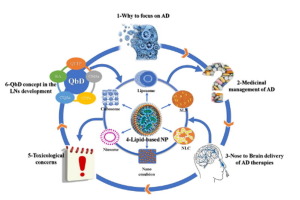当前位置:
X-MOL 学术
›
Eur. J. Pharm. Biopharm.
›
论文详情
Our official English website, www.x-mol.net, welcomes your
feedback! (Note: you will need to create a separate account there.)
Progress and perspectives of brain-targeting lipid-based nanosystems via the nasal route in Alzheimer's disease.
European Journal of Pharmaceutics and Biopharmaceutics ( IF 4.4 ) Pub Date : 2020-01-08 , DOI: 10.1016/j.ejpb.2019.12.014 Hussein Akel 1 , Ruba Ismail 2 , Ildikó Csóka 2
European Journal of Pharmaceutics and Biopharmaceutics ( IF 4.4 ) Pub Date : 2020-01-08 , DOI: 10.1016/j.ejpb.2019.12.014 Hussein Akel 1 , Ruba Ismail 2 , Ildikó Csóka 2
Affiliation

|
Since health care systems dedicate substantial resources to Alzheimer's disease (AD), it poses an increasing challenge to scientists and health care providers worldwide, especially that many decades of research in the medical field revealed no optimal effective treatment for this disease. The intranasal administration route seems to be a preferable route of anti-AD drug delivery over the oral one as it demonstrates an ability to overcome the related obstacles reflected in low bioavailability, limited brain exposure and undesired pharmacokinetics or side effects. This delivery route can bypass the systemic circulation through the intraneuronal and extraneuronal pathways, providing truly needleless and direct brain drug delivery of the therapeutics due to its large surface area, porous endothelial membrane, the avoidance of the first-pass metabolism, and ready accessibility. Among the different nano-carrier systems developed, lipid-based nanosystems have become increasingly popular and have proven to be effective in managing the common symptoms of AD when administered via the nose-to-brain delivery route, which provides an answer to circumventing the BBB. The design of such lipid-based nanocarriers could be challenging since many factors can contribute to the quality of the final product. Hence, according to the authors, it is recommended to follow the quality by design methodology from the early stage of development to ensure high product quality while saving efforts and costs. This review article aims to draw attention to the up-to-date findings in the field of lipid-based nanosystems and the potential role of developing such forms in the management of AD by means of the nose-to-brain delivery route, in addition to highlighting the significant role of applying QbD methodology in this development.
中文翻译:

通过鼻途径在阿尔茨海默氏病中靶向脑的脂质纳米系统的研究进展和前景。
由于医疗保健系统为阿尔茨海默氏病(AD)投入了大量资源,因此对全世界的科学家和医疗保健提供者构成了越来越大的挑战,尤其是在医学领域数十年的研究表明,没有针对这种疾病的最佳有效治疗方法。鼻内给药途径似乎是抗-AD药物递送优于口服给药途径的优选途径,因为它表现出克服低生物利用度,有限的脑暴露和不希望的药代动力学或副作用所反映的相关障碍的能力。这种递送途径可以通过神经内和神经外途径绕过全身循环,由于其表面积大,多孔的内皮膜,避免首过代谢,并易于使用。在开发的不同纳米载体系统中,基于脂质的纳米系统已变得越来越流行,并已证明可有效地通过鼻-脑输送途径来管理AD的常见症状,这为规避BBB提供了答案。这种基于脂质的纳米载体的设计可能具有挑战性,因为许多因素都可能影响最终产品的质量。因此,根据作者的说法,建议从开发的早期就遵循设计方法论的质量,以确保较高的产品质量,同时节省工作量和成本。
更新日期:2020-01-09
中文翻译:

通过鼻途径在阿尔茨海默氏病中靶向脑的脂质纳米系统的研究进展和前景。
由于医疗保健系统为阿尔茨海默氏病(AD)投入了大量资源,因此对全世界的科学家和医疗保健提供者构成了越来越大的挑战,尤其是在医学领域数十年的研究表明,没有针对这种疾病的最佳有效治疗方法。鼻内给药途径似乎是抗-AD药物递送优于口服给药途径的优选途径,因为它表现出克服低生物利用度,有限的脑暴露和不希望的药代动力学或副作用所反映的相关障碍的能力。这种递送途径可以通过神经内和神经外途径绕过全身循环,由于其表面积大,多孔的内皮膜,避免首过代谢,并易于使用。在开发的不同纳米载体系统中,基于脂质的纳米系统已变得越来越流行,并已证明可有效地通过鼻-脑输送途径来管理AD的常见症状,这为规避BBB提供了答案。这种基于脂质的纳米载体的设计可能具有挑战性,因为许多因素都可能影响最终产品的质量。因此,根据作者的说法,建议从开发的早期就遵循设计方法论的质量,以确保较高的产品质量,同时节省工作量和成本。











































 京公网安备 11010802027423号
京公网安备 11010802027423号